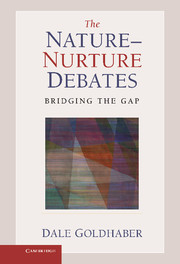7 - Now What?
Published online by Cambridge University Press: 05 August 2012
Summary
There is no question but that one's genotype significantly influences one's course of development. And there is no question but that one's environment significantly influences one's course of development. But there is now also no question that the way that the classic debate has attempted, for more than 100 years, to explain the role of each has done more harm than good, both in terms of our conceptual understanding of the course of development and in terms of the inappropriate policy and practice recommendations that have flowed from such a flawed perspective. As I said earlier, it really is incredible.
The classic debate's reliance on main-effects statistical models simply no longer reflects what we understand about the interdependence of nature and nurture. A statistical model not only needs to be mathematically accurate; it needs to accurately model the phenomenon of interest as well. The main-effects model may pass the first test, but it no longer passes the second test. In fact, it may never have passed the second test because partitioning variance is at heart an illusion. There is in reality no such thing as an independent effect.
- Type
- Chapter
- Information
- The Nature-Nurture DebatesBridging the Gap, pp. 141 - 162Publisher: Cambridge University PressPrint publication year: 2012



